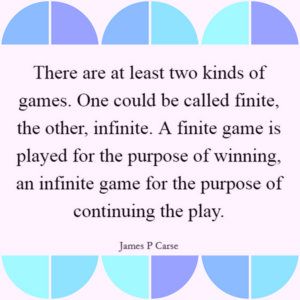In a previous post, I described the undue pressures of scarcity on young people. Scarcity is an unfortunate staple in our culture that leads young people to a feeling of not measuring up and unfair comparisons. When scarcity is present there is often a game being played as a result. James Carse, in his book on Finite and Infinite Games, describes finite games as being played for the purpose of winning. Students with the greatest number of activities on their resume, class rank, and the number of A’s available in a curved graded class are examples of this finite game being played in many high schools. But there are other healthier options to create what is known as an infinite game for our children.
An influential counselor is uniquely positioned to support students to focus on the infinite game. Carse describes the infinite game where the object is to avoid having winners and losers, instead perpetuating a game filled with a centered vision of play and possibility. While college admission is in the business of differentiating students, high schools are in the business of developing all students.
To reduce pressure on students and still provide colleges the information they desire from applicants, make sure your students and their parents understand how to approach certain elements of admissions:
- Realistic goal setting: Beginning high school with the goal of acceptance to an Ivy League university immediately puts a child into the finite game where there is pressure in all areas of a young life to win that prize. A counselor can re-frame around the opportunities of adolescence to explore interests in learning, have fun and practice newfound skills ultimately will reveal post-secondary options that are child centered.
- Activities outside the classroom: Accomplishments of children should yield to their interests, curiosity, or opportunities for development in areas where they have blind spots- the quality and purpose of activities, and not the volume should be the goal.
Get a seat at the table within a school district or college advisory board where we can provide insight that schools are charged with developing all students in a classroom, school or community and not differentiating them. Consider sharing research-based insights to educators around the elimination of the most finite elements of academic culture:
- The unhealthy use of bell curves for a classroom test: Grading should be about individual learning and not how you compare to others in the class.
- The zero-sum game of ranking students in a graduating class.
- Weighting courses on a transcript for GPA calculation: Weighting creates a more frenzied game that favors students with more resources (time and treasure) and perpetuates inequity. Colleges will do their own weighting of a high school transcript according to a student’s opportunity to challenge a curriculum available to them.
Positioning oneself to perpetuate these infinite opportunities for all students can start immediately in a school or community. There is a certain vulnerability and boldness to our role for supporting the whole child and I hope to connect us to this thinking in my next post.

Perfectly Pertinent Podcasts
Sharing the right podcasts can extend, enrich, and deepen your influence as a counselor.
One for your students:
Winning the Game of School (Tests and the Rest)
One for their parents:
Avoiding the Pageant Approach to College Admissions (Tests and the Rest)
One for you and your colleagues:
Multipotentiality – When There’s More Than One Right Answer (The Neurodiversity Podcast)
SCHOLARSHIP: Jeanne Lucas Memorial Scholarship

Did you enjoy this issue of The Influential Counselor? Get the next issue right in your inbox by subscribing below:
